CSC/ECE 517 Fall 2021 - E2122. Refactor impersonate controller.rb
This wiki page describes the changes made under E2122, in order to refactor impersonate_controller.rb.
Overview
About Expertiza
Expertiza is an open source project based on Ruby on Rails framework. Expertiza allows the instructor to create new assignments and customize new or existing assignments. It also allows the instructor to create a list of topics the students can sign up for. Students can form teams in Expertiza to work on various projects and assignments. Students can also peer review other students' submissions. Expertiza supports submission across various document types, including the URLs and wiki pages.
Issues for this project
- Issue 1: Throughout the file, the user is being initialized but never used. This is bad coding practice as it slows down runtime.
- Issue 2: Convert nested if to elif around line 36.
- Issue 3: Refactor very long lines of code to make it more readable.
- Issue 4: Test functions and increase coverage:
- auto_complete_for_user_name
- overwrite_session test line 47-51
- test_
Project implementation
Submitted work and demonstration of project
Files involved
- app/controllers/impersonate_controller.rb - the refactored source code.
- spec/controllers/impersonate_controller_spec.rb - the related tests toward our refactoring.
Code changes
This part shows the changes in ./app/controllers/impersonate_controller.rb
In function overwrite_session
Before
def overwrite_session
# If not impersonatable, then original user's session remains
if params[:impersonate].nil?
# E1991 : check whether instructor is currently in anonymized view
user = User.anonymized_view?(session[:ip]) ? User.real_user_from_anonymized_name(params[:user][:name]) : user = User.find_by(name: params[:user][:name])
session[:super_user] = session[:user] if session[:super_user].nil?
AuthController.clear_user_info(session, nil)
session[:original_user] = @original_user
session[:impersonate] = true
session[:user] = user
else
# If some user is to be impersonated, their session details are overwritten onto the current to impersonate
if !params[:impersonate][:name].empty?
# E1991 : check whether instructor is currently in anonymized view
user = User.anonymized_view?(session[:ip]) ? User.real_user_from_anonymized_name(params[:impersonate][:name]) : user = user = User.find_by(name: params[:impersonate][:name])
AuthController.clear_user_info(session, nil)
session[:user] = user
session[:impersonate] = true
session[:original_user] = @original_user
else
# E1991 : check whether instructor is currently in anonymized view
user = User.anonymized_view?(session[:ip]) ? User.real_user_from_anonymized_name(params[:user][:name]) : user = User.find_by(name: params[:user][:name])
AuthController.clear_user_info(session, nil)
session[:user] = session[:super_user]
user = session[:user]
session[:super_user] = nil
end
end
end
After
def overwrite_session
# If not impersonatable, then original user's session remains
if params[:impersonate].nil?
# E1991 : check whether instructor is currently in anonymized view
if User.anonymized_view?(session[:ip])
user = User.real_user_from_anonymized_name(params[:user][:name])
else
user = User.find_by(name: params[:user][:name])
end
session[:super_user] = session[:user] if session[:super_user].nil?
AuthController.clear_user_info(session, nil)
session[:original_user] = @original_user
session[:impersonate] = true
session[:user] = user
# If some user is to be impersonated, their session details are overwritten onto the current to impersonate
elsif !params[:impersonate][:name].empty?
# E1991 : check whether instructor is currently in anonymized view
if User.anonymized_view?(session[:ip])
user = User.real_user_from_anonymized_name(params[:impersonate][:name])
else
user = User.find_by(name: params[:impersonate][:name])
end
AuthController.clear_user_info(session, nil)
session[:user] = user
session[:impersonate] = true
session[:original_user] = @original_user
else
# E1991 : check whether instructor is currently in anonymized view
AuthController.clear_user_info(session, nil)
session[:user] = session[:super_user]
session[:super_user] = nil
end
end
In function check_if_special_char
Before
def check_if_special_char
if params[:user]
if warn_for_special_chars(params[:user][:name], "Username")
redirect_back
return
end
end
if params[:impersonate]
if warn_for_special_chars(params[:impersonate][:name], "Username")
redirect_back
return
end
end
end
After
def check_if_special_char
if params[:user] && warn_for_special_chars(params[:user][:name], "Username")
redirect_back
return
end
if params[:impersonate] && warn_for_special_chars(params[:impersonate][:name], "Username")
redirect_back
return
end
end
In function check_if_user_impersonateable
Before
def check_if_user_impersonateable
if params[:impersonate].nil?
# E1991 : check whether instructor is currently in anonymized view
user = User.anonymized_view?(session[:ip]) ? User.real_user_from_anonymized_name(params[:user][:name]) : user = User.find_by(name: params[:user][:name])
if !@original_user.can_impersonate? user
@message = "You cannot impersonate '#{params[:user][:name]}'."
temp
@@ -85,7 +89,6 @@ def check_if_user_impersonateable
else
unless params[:impersonate][:name].empty?
# E1991 : check whether instructor is currently in anonymized view
user = User.anonymized_view?(session[:ip]) ? User.real_user_from_anonymized_name(params[:impersonate][:name]) : user = user = User.find_by(name: params[:impersonate][:name])
overwrite_session
end
end
end
After
def check_if_user_impersonateable
if params[:impersonate].nil?
# E1991 : check whether instructor is currently in anonymized view
if User.anonymized_view?(session[:ip])
user = User.real_user_from_anonymized_name(params[:user][:name])
else
user = User.find_by(name: params[:user][:name])
end
if !@original_user.can_impersonate? user
@message = "You cannot impersonate '#{params[:user][:name]}'."
temp
@@ -85,7 +89,6 @@ def check_if_user_impersonateable
else
unless params[:impersonate][:name].empty?
# E1991 : check whether instructor is currently in anonymized view
overwrite_session
end
end
end
In function display_error_msg
Before
def display_error_msg
if params[:user]
@message = "No user exists with the name '#{params[:user][:name]}'."
elsif params[:impersonate]
@message = "No user exists with the name '#{params[:impersonate][:name]}'."
else
if params[:impersonate].nil?
@message = "You cannot impersonate '#{params[:user][:name]}'."
else
if !params[:impersonate][:name].empty?
@message = "You cannot impersonate '#{params[:impersonate][:name]}'."
else
@message = "No original account was found. Please close your browser and start a new session."
end
end
end
rescue Exception => e
flash[:error] = @message
end
After
def display_error_msg
if params[:user]
@message = "No user exists with the name '#{params[:user][:name]}'."
elsif params[:impersonate]
@message = "No user exists with the name '#{params[:impersonate][:name]}'."
elsif params[:impersonate].nil?
@message = "You cannot impersonate '#{params[:user][:name]}'."
elsif !params[:impersonate][:name].empty?
@message = "You cannot impersonate '#{params[:impersonate][:name]}'."
else
@message = "No original account was found. Please close your browser and start a new session."
end
rescue Exception => e
flash[:error] = @message
end
In function impersonate
Before
def impersonate
# Initial check to see if the username exists
display_error_msg
begin
@original_user = session[:super_user] || session[:user]
# Impersonate using form on /impersonate/start, based on the username provided, this method looks to see if that's possible by calling the do_main_operation method
if params[:impersonate].nil?
# Check if special chars /\?<>|&$# are used to avoid html tags or system command
check_if_special_char
# E1991 : check whether instructor is currently in anonymized view
user = User.anonymized_view?(session[:ip]) ? User.real_user_from_anonymized_name(params[:user][:name]) : user = User.find_by(name: params[:user][:name])
do_main_operation(user)
else
# Impersonate a new account
if !params[:impersonate][:name].empty?
#check if special chars /\?<>|&$# are used to avoid html tags or system command
check_if_special_char
# E1991 : check whether instructor is currently in anonymized view
user = User.anonymized_view?(session[:ip]) ? User.real_user_from_anonymized_name(params[:impersonate][:name]) : user = user = User.find_by(name: params[:impersonate][:name])
do_main_operation(user)
# Revert to original account when currently in the impersonated session
else
if !session[:super_user].nil?
AuthController.clear_user_info(session, nil)
session[:user] = session[:super_user]
user = session[:user]
session[:super_user] = nil
else
display_error_msg
end
end
end
After
def impersonate
# Initial check to see if the username exists
display_error_msg
begin
@original_user = session[:super_user] || session[:user]
# Impersonate using form on /impersonate/start, based on the username provided, this method looks to see if that's possible by calling the do_main_operation method
if params[:impersonate].nil?
# Check if special chars /\?<>|&$# are used to avoid html tags or system command
check_if_special_char
# E1991 : check whether instructor is currently in anonymized view
if User.anonymized_view?(session[:ip])
user = User.real_user_from_anonymized_name(params[:user][:name])
else
user = User.find_by(name: params[:user][:name])
end
do_main_operation(user)
elsif !params[:impersonate][:name].empty?
# Impersonate a new account
#check if special chars /\?<>|&$# are used to avoid html tags or system command
check_if_special_char
# E1991 : check whether instructor is currently in anonymized view
if User.anonymized_view?(session[:ip])
user = User.real_user_from_anonymized_name(params[:impersonate][:name])
else
user = User.find_by(name: params[:impersonate][:name])
end
do_main_operation(user)
# Revert to original account when currently in the impersonated session
elsif !session[:super_user].nil?
AuthController.clear_user_info(session, nil)
session[:user] = session[:super_user]
user = session[:user]
session[:super_user] = nil
else
display_error_msg
end
Test Plan
Manual UI Testing
The following steps must be performed to test the project UI:
Step 1: Log in as an Instructor, with Username - "super_administrator2", Password - "password"
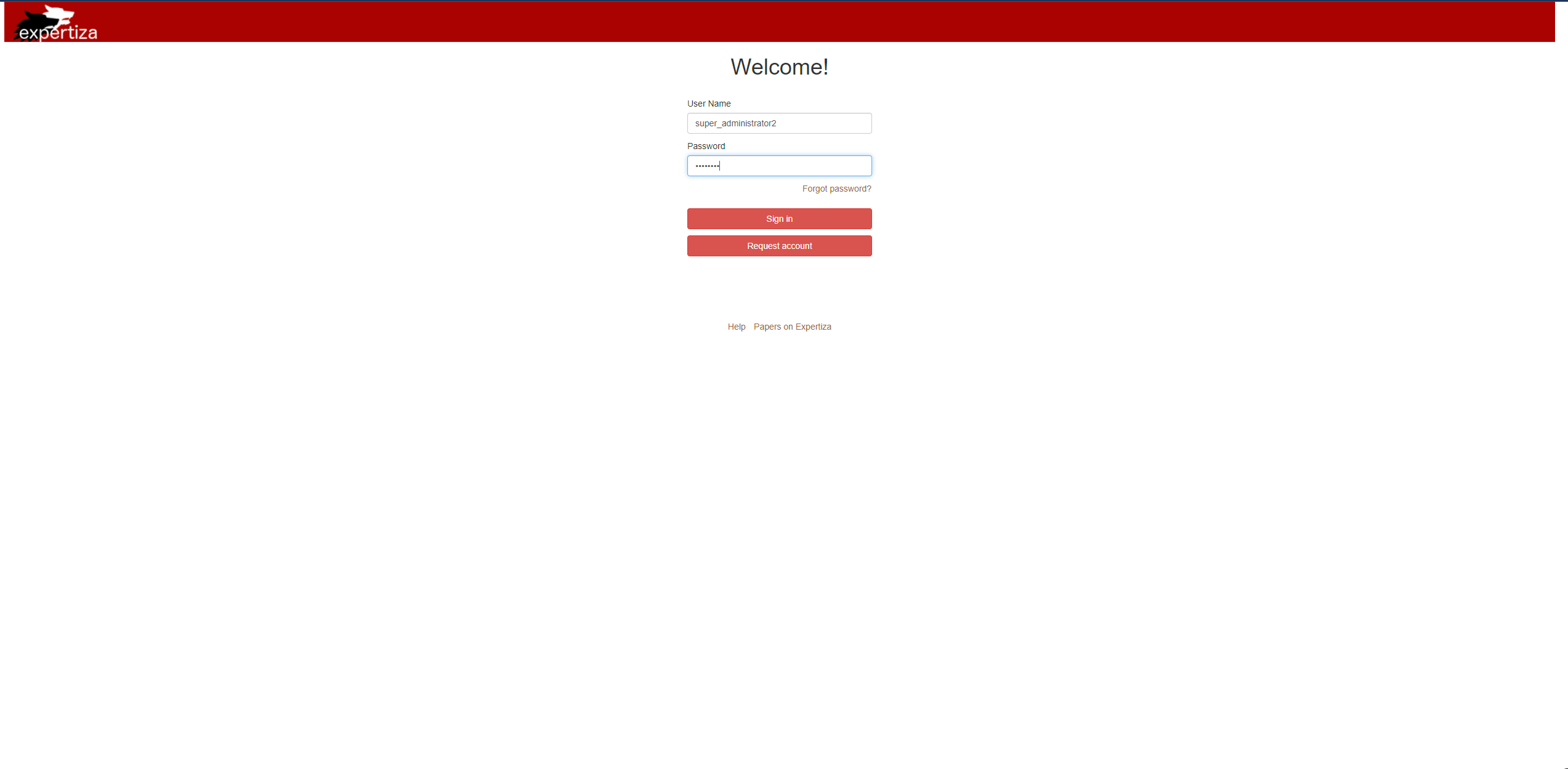
Step 2: Select the function from the top menu "Impersonate user".
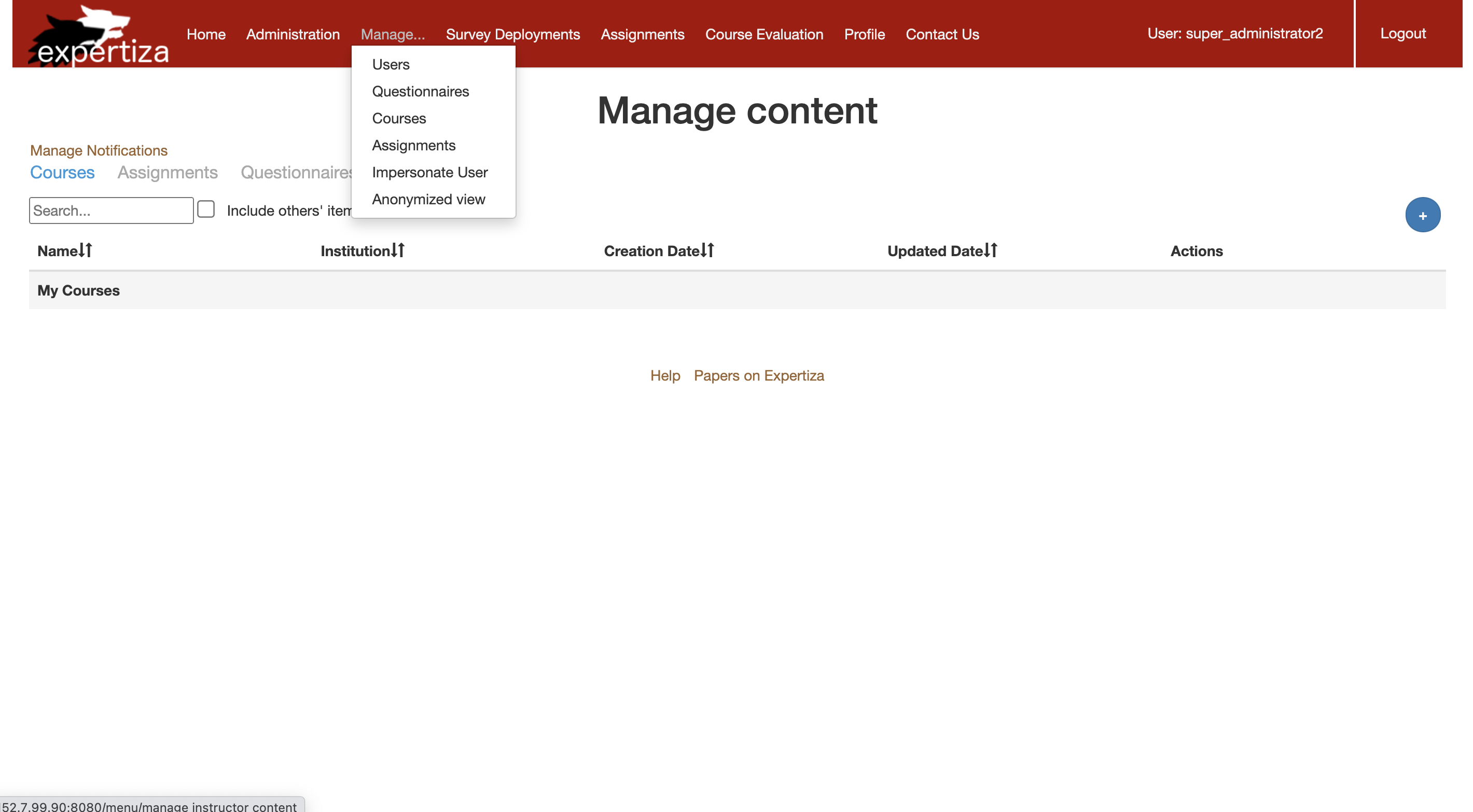
Step 3: Type the username to impersonate (here we use "student11" for test).
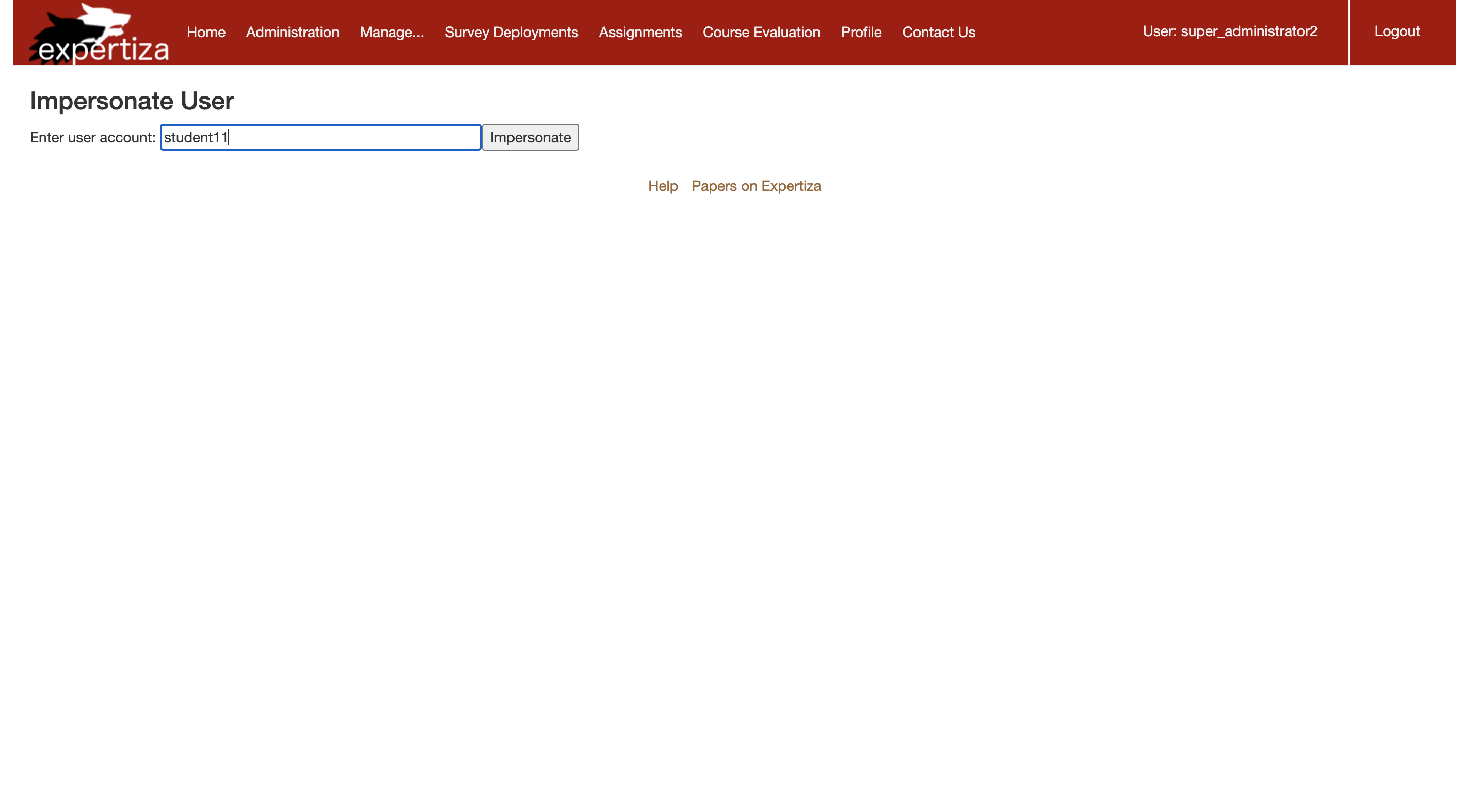
This view below is generated after clicking the button "Impersonate":
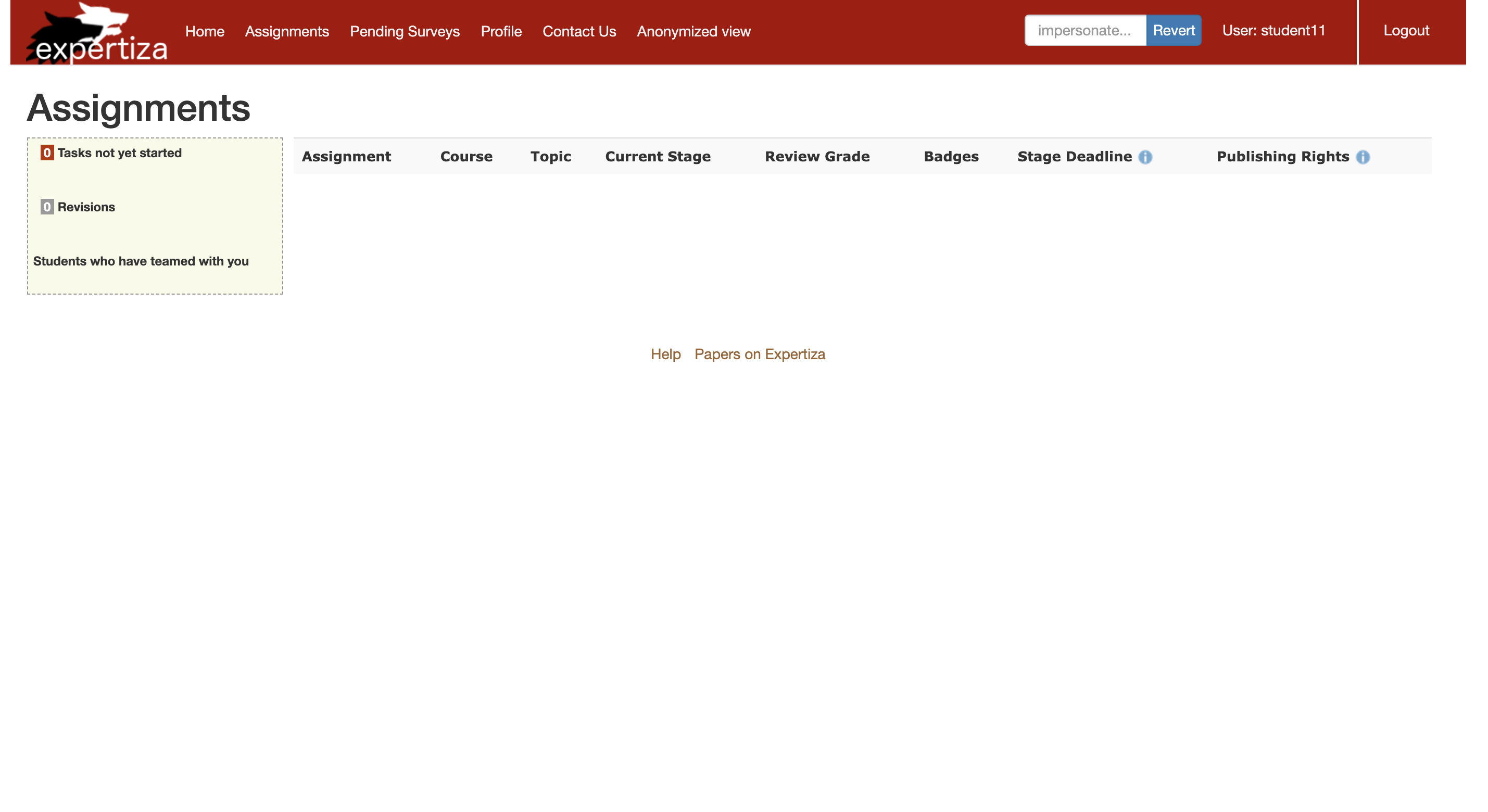
Step 4: Change the user to impersonate from the textbox at the top bar (here we use "student13" for test).
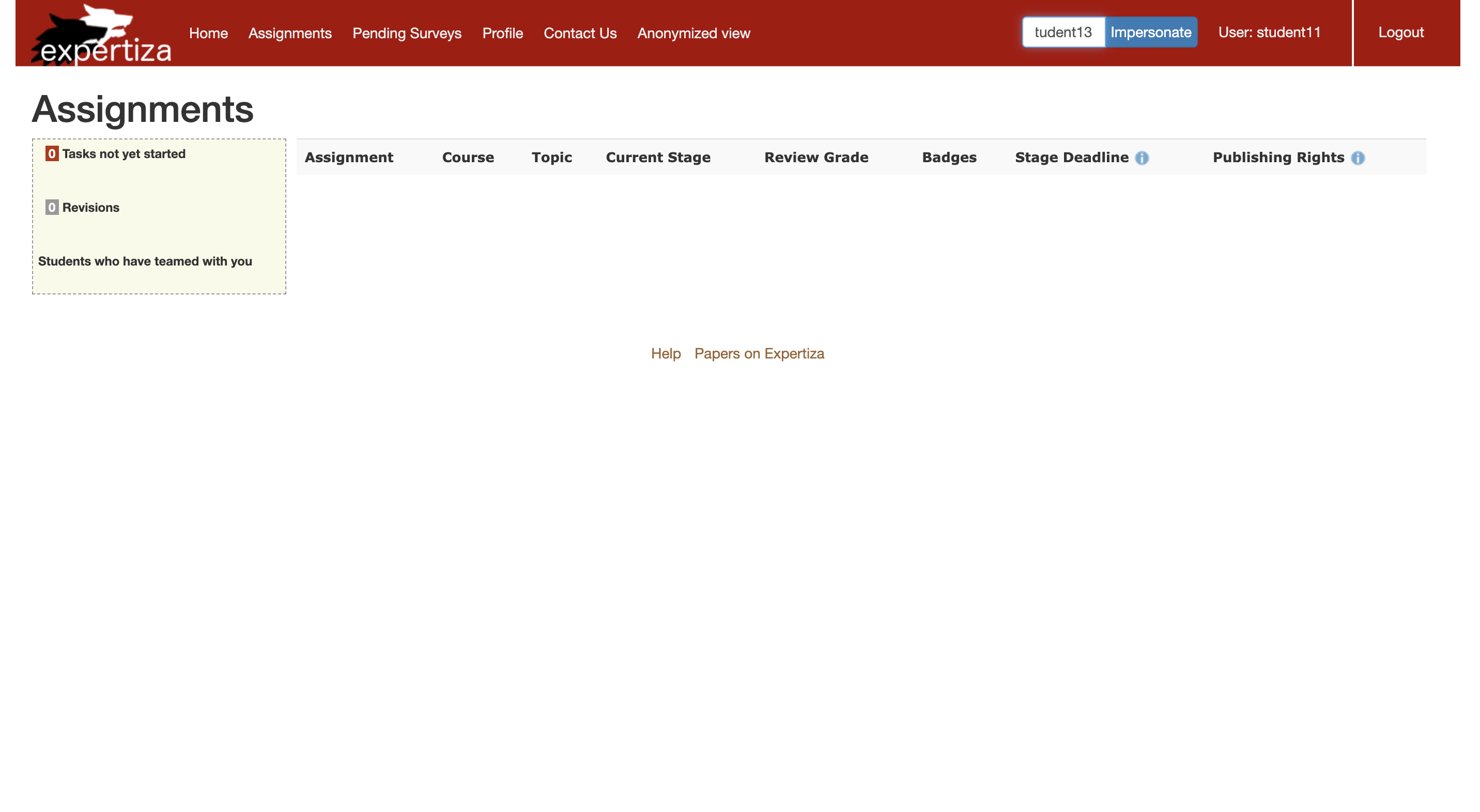
This view below is generated after clicking the button "Revert":
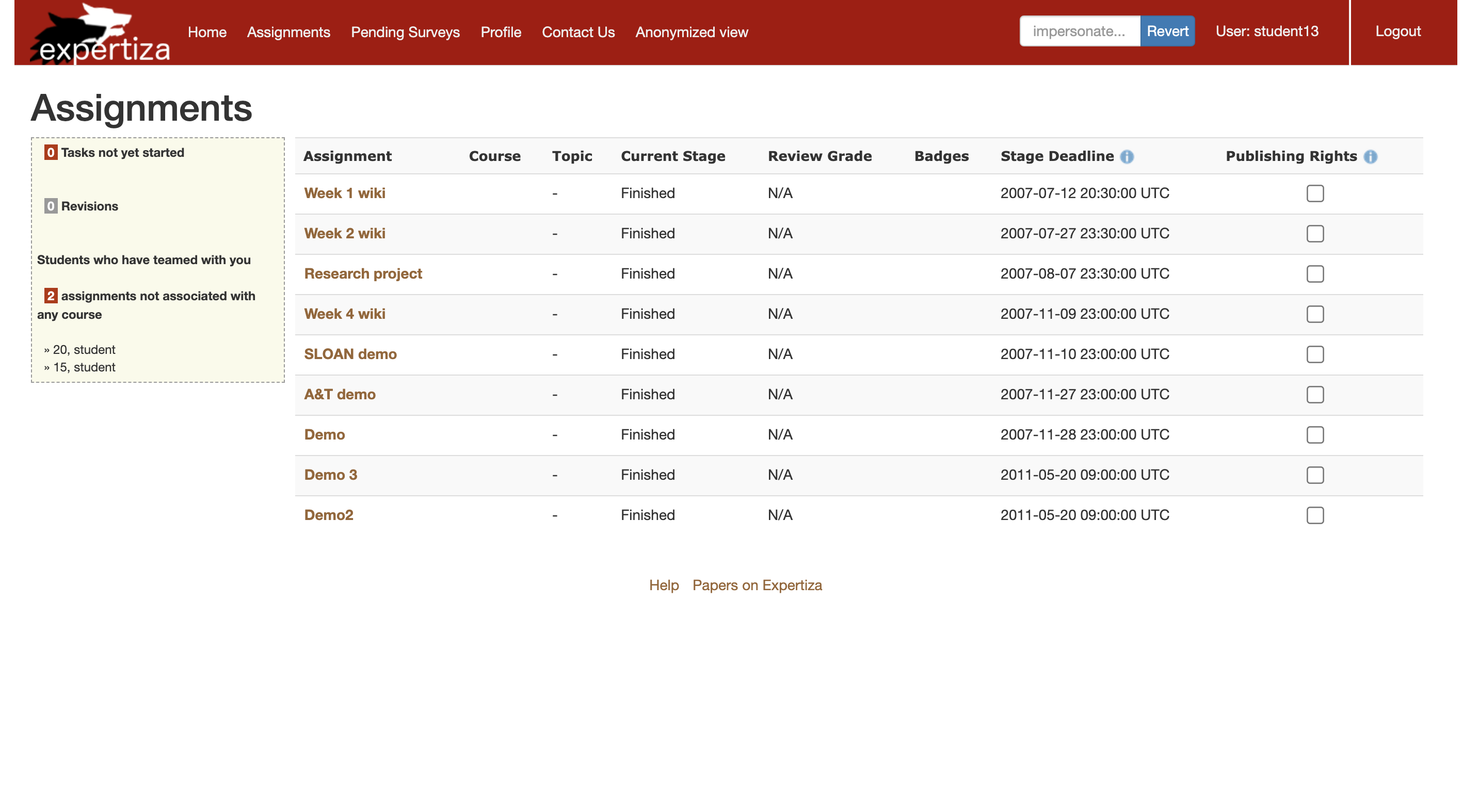
Step 5: Return to super_administrator2 by clicking the button "Revert" without filling out the textbox.
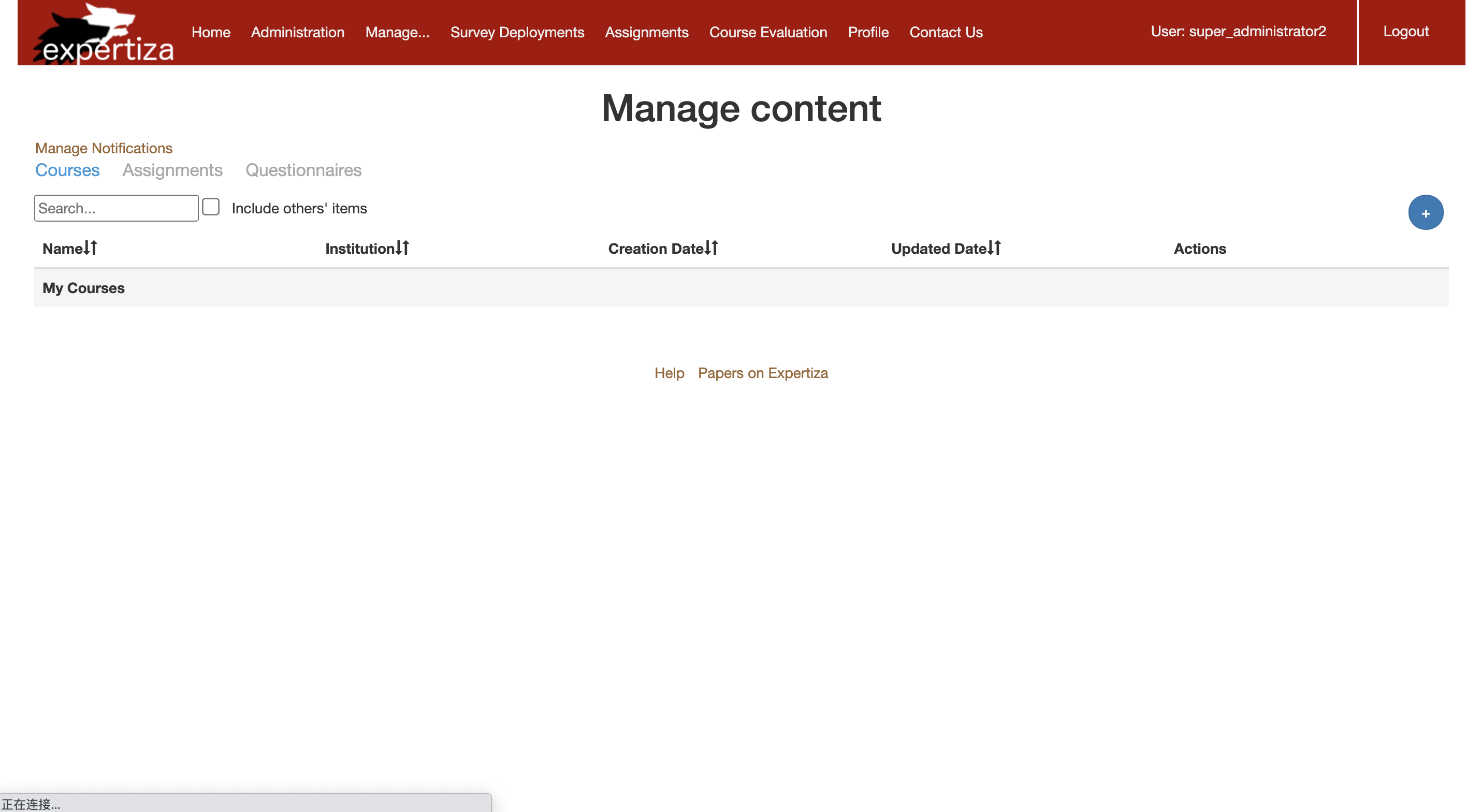
PS: We found some unknown internal errors (response 500) as the result of impersonating some students (for example: "student7" to "student10"). The reason for this error might be some improper values were generated for these users.
"student11" and "student13" are manually tested, which are able to impersonate.
RSpec Testing
In the file ./spec/controllers/impersonate_controller_spec.rb
The following RSpec test is modified.
Before
it 'instructor should be able to impersonate a user while already impersonating a user but from nav bar' do
allow(User).to receive(:find_by).with(name: student1.name).and_return(student1)
allow(User).to receive(:find_by).with(name: student2.name).and_return(student2)
allow(instructor).to receive(:can_impersonate?).with(student1).and_return(true)
allow(instructor).to receive(:can_impersonate?).with(student2).and_return(true)
request.env["HTTP_REFERER"] = "http://www.example.com"
@params = { user: { name: student1.name } }
@session = { user: instructor }
post :impersonate, @params, @session
# nav bar uses the :impersonate as the param name, so let make sure it always works from there too.
@params = { impersonate: { name: student2.name } }
post :impersonate, @params, @session
expect(session[:super_user]).to eq instructor
expect(session[:user]).to eq student2
expect(session[:original_user]).to eq instructor
expect(session[:impersonate]).to be true
end
After
it 'instructor should be able to impersonate a user while already impersonating a user but from nav bar' do
allow(User).to receive(:find_by).with(name: student1.name).and_return(student1)
allow(User).to receive(:find_by).with(name: student2.name).and_return(student2)
allow(instructor).to receive(:can_impersonate?).with(student1).and_return(true)
allow(instructor).to receive(:can_impersonate?).with(student2).and_return(true)
request.env["HTTP_REFERER"] = "http://www.example.com"
@params = { user: { name: student1.name } }
@session = { user: instructor }
post :impersonate, @params, @session
expect(session[:user]).to eq student1
expect(session[:super_user]).to eq instructor
# nav bar uses the :impersonate as the param name, so let make sure it always works from there too.
@params = { impersonate: { name: student2.name } }
post :impersonate, @params, @session
expect(session[:super_user]).to eq instructor
expect(session[:user]).to eq student2
expect(session[:original_user]).to eq instructor
expect(session[:impersonate]).to be true
end
The following tests are implemented and added.
it 'instructor should revert to himself while already impersonating a user' do
allow(User).to receive(:find_by).with(name: student1.name).and_return(student1)
allow(User).to receive(:find_by).with(name: '').and_return('')
allow(instructor).to receive(:can_impersonate?).with(student1).and_return(true)
allow(instructor).to receive(:can_impersonate?).with('').and_return(true)
request.env["HTTP_REFERER"] = "http://www.example.com"
@params = { user: { name: student1.name } }
@session = { user: instructor }
post :impersonate, @params, @session
expect(session[:user]).to eq student1
expect(session[:impersonate]).to be true
# nav bar uses the :impersonate as the param name, so let make sure it always works from there too.
@params = { impersonate: { name: '' } }
post :impersonate, @params, @session
expect(session[:user]).to eq instructor
expect(session[:impersonate]).to be true
expect(session[:super_user]).to eq nil
end
it 'when typing the user name, there should be all possible complete user names appearing ' do
@params = { user: {name: 'A' }}
get :auto_complete_for_user_name,@params
expect(response.body).to eq "<%= auto_complete_result @users, 'Amanda' %>"
end
PS: Some issues we found during the test are related to some other files. The detailed information is listed in our pull request (E2122. Refactor impersonate_controller.rb).
Team Information
Mentor: John Bumgardner (jwbumga2)
Robin Piao (lpiao)
Shengjie Guo (sguo25)
Haoze Du (hdu5)